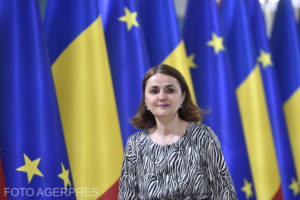The head of Romanian diplomacy, Luminiţa Odobescu, participated, on Monday, in Brussels, in the EU foreign affairs ministers’ meeting. Russia’s aggression against Ukraine was also on the agenda. The security situation at Romania’s borders, in the Black Sea region, is a reason for concern for both the allies and the EU, Luminiţa Odobescu said. „Our efforts are currently focused on continuing support for Ukraine, on a more closer coordination and and on finding solutions not only on a bilateral level, but also on a European level,” the Romanian foreign minister said. As regards Russia’s aggression against his country, the Ukrainian foreign minister, Dmytro Kuleba, presented, via videoconference, the situation on the ground and the recent internal developments.
Minister Odobescu highlighted the importance of maintaining Russia’s aggression against Ukraine as a priority topic on the EU agenda and reiterated the multidimensional support for it, for as long as needed. Also, Luminiţa Odobescu emphasized the need for predictability of the EU’s financial and military assistance for Ukraine, in line with the decisions of the European Council from December 2023. The Romanian official also highlighted the need for the necessary steps to be taken to open EU accession negotiations with both Ukraine and Moldova. On the other hand, the Romanian minister expressed her support for Ukraine’s Peace Formula, with an emphasis on continuing diplomatic efforts in order to increase the support of global partners.
She mentioned the initiation, on January 14, of diplomatic negotiations with a view to agreeing on a bilateral cooperation framework in the field of security, in the implementation of the G7 Joint Declaration of support for Ukraine (July 2023). In her opinion, the pressure on Russia needs to be maintained, through sanctions and strategic communication meant to combat the disinformation spread by it, including from the perspective of marking, on February 24, 2022, almost two years since the start of the war. Ukraine is critically dependent on funding from the EU and the US, while continuing to fight the Russian occupation forces.
A month ago, Hungary blocked the EU’s 50 billion euro aid to Ukraine, and a new decision could be taken in the European Council on February 1st. According to analysts, ending the conflict is difficult, given that Russia has a high resistance capacity and can lose hundreds of thousands of soldiers.
Mihai Pelin, Radio Romania International











